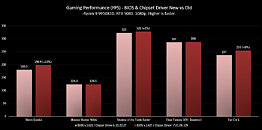
MSI Outs Socket AM5 Motherboard Firmware Updates with AGESA 1.2.0.3F and Next-Gen APU Support
MSI began rolling out UEFI firmware updates for its Socket AM5 motherboard lineup that encapsulate AMD AGESA 1.2.0.3F microcode. This latest version of AGESA comes with support for several new upcoming processor SKUs, including Ryzen 9000F series, which are "Granite Ridge" based chips with integrated graphics disabled; as well as AMD's upcoming Ryzen 9000G series desktop APUs, which are expected to be based on the 4 nm "Krackan Point" monolithic silicon. This chip features a 12-core CPU (4x "Zen 5" + 8x "Zen 5c"), a powerful iGPU based on RDNA 3.5 graphics architecture with up to 16 compute units; and the Ryzen AI XDNA 2 NPU capable of 50 AI TOPS, meeting Microsoft Copilot+ local acceleration requirements.
Besides support for new processors, AGESA 1.2.0.3F is also expected to lend 256 GB platform maximum memory support using four 64 GB DIMMs (2 DIMMs per channel). The firmware carries over many of the fTPM security vulnerability mitigations introduced with AGESA 1.2.0.3, which are recommended for all users. Lastly, MSI introduced several overclocking stability improvements with its latest firmware updates. Grab these updates from the Support section of the product page of your motherboard model on the MSI website.
Besides support for new processors, AGESA 1.2.0.3F is also expected to lend 256 GB platform maximum memory support using four 64 GB DIMMs (2 DIMMs per channel). The firmware carries over many of the fTPM security vulnerability mitigations introduced with AGESA 1.2.0.3, which are recommended for all users. Lastly, MSI introduced several overclocking stability improvements with its latest firmware updates. Grab these updates from the Support section of the product page of your motherboard model on the MSI website.




















































